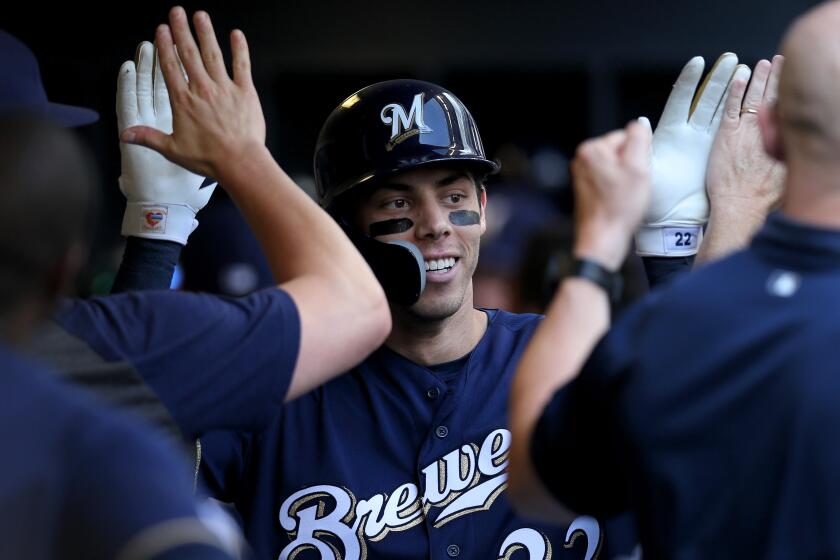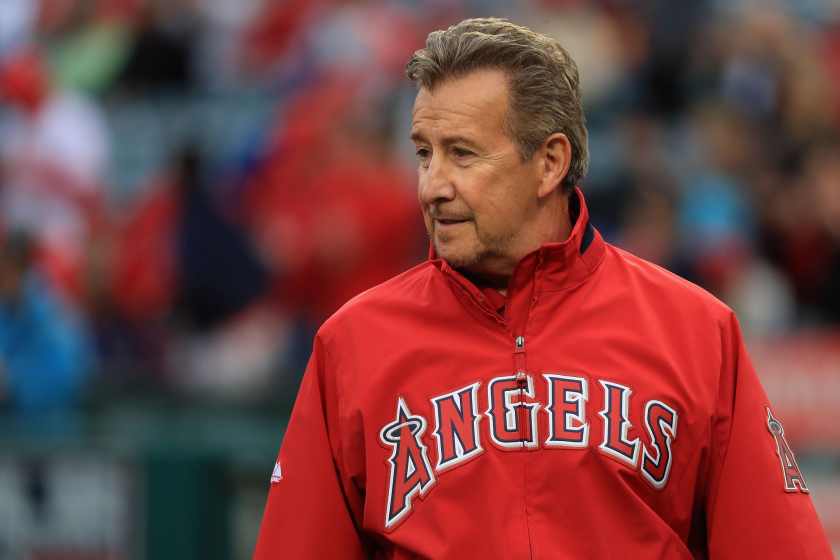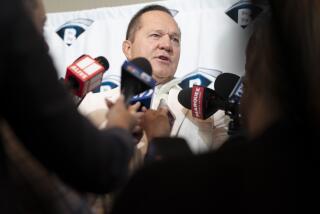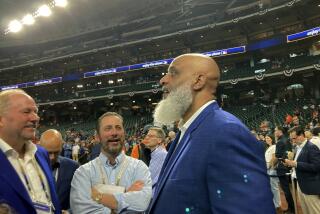Analysis: Why MLB players likely will prevail on getting full prorated salary
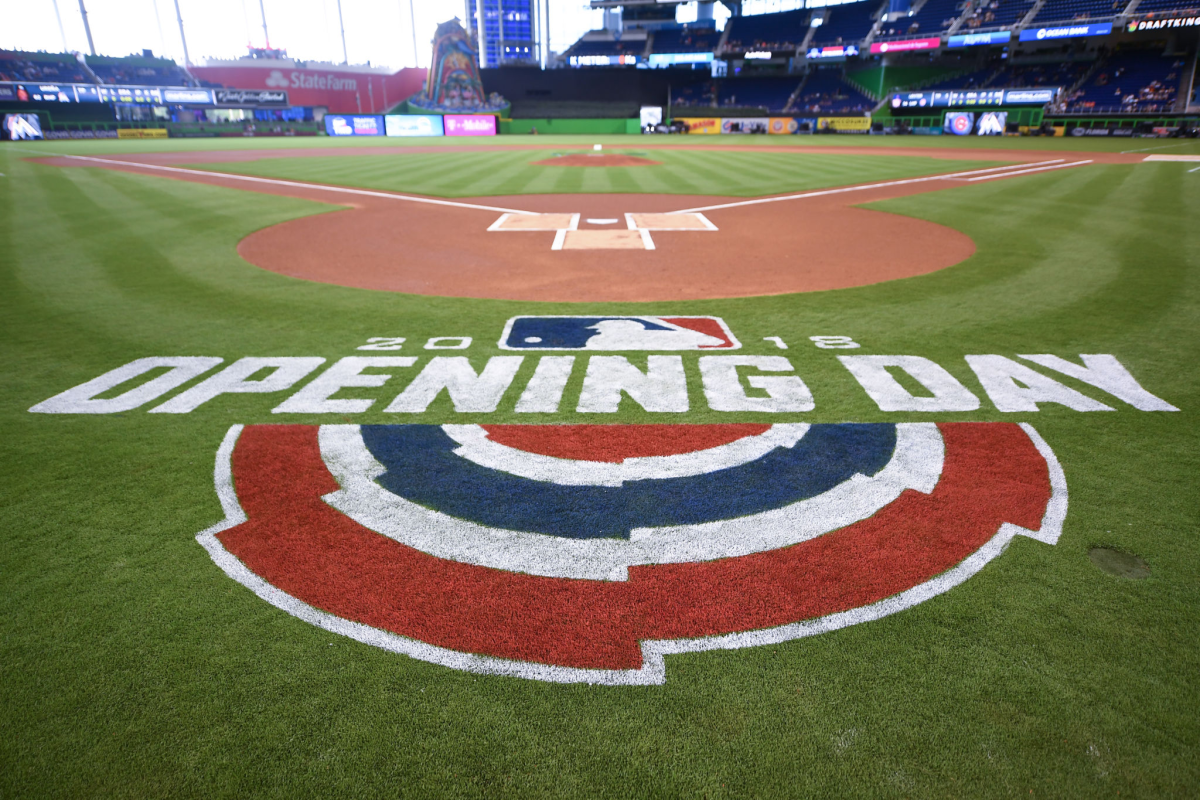
- Share via
After weeks of unseemly public bickering, Major League Baseball owners and players appear to be headed toward starting the 2020 season on or around July 10. The long-running and oft-acrimonious negotiations have centered around one sticking point: Are players obligated to renegotiate salaries for games played in fan-free ballparks?
The owners say yes. The players say no.
Based on a Times review of the March 26 agreement in question, the answer appears to be no.
The players likely will prevail on that score, to the frustration of owners who believe the players’ union has to negotiate on salary. The owners have been waiting for the players to compromise on the issue, but players have refused to do so in each of their proposals, and the language in the agreement appears to favor the players.
Whether the two sides strike a deal or the owners impose one, the players can expect to be paid a prorated salary for every game played, despite the owners publicly calling for reduced salaries for players.
“I think we have been negotiating from the standpoint that there is a false premise that the agreement … required pro-rata salaries to be paid. That’s just not accurate,” Arizona Diamondbacks owner Ken Kendrick said Tuesday on Arizona Sports 98.7. “And it’s so inaccurate that it just infuriates me every time. I know that’s the position the players are taking. I believe they’re heavily influenced by outside forces to take that position. But that was built around the idea that we would come back and play baseball under normal circumstances.”
The March agreement, struck two weeks after the coronavirus outbreak shut down spring training, specified how much players would be paid if the season were canceled. In the case of games being played this season, the section of the agreement entitled “Player Compensation and Benefits” has this language: “If and when the conditions exist for the commencement of the 2020 championship season, all players signed to a Major League [contract] shall be paid a daily salary rate,” specified as a prorated salary.
Former MLBPA executive Gene Orza can’t imagine negotiating with owners through Zoom, but that isn’t the only factor making current talks unique.
That is the prorated salary upon which players have stood firm. But how is it determined if and when the conditions exist to start the season?
The “Resumption of Play” section of the agreement sets three criteria: no restrictions against fans attending games; no restrictions on travel through the United States and Canada; no unreasonable health or safety risk to players, staff or fans.
“Since those three conditions have not been met,” New York Yankees president Randy Levine told the New York Post last month, “the agreement says that, based on those facts and the economic feasibility of the moment, there has to be a renegotiation on salaries. That is not my opinion, that is what the text of the agreement says.”
Not quite. This is what the text says: “The Office of the Commissioner and Players Association will discuss in good faith the economic feasibility of playing games in the absence of spectators.”
Levine said he had reviewed the league’s notes from bargaining sessions. The Post obtained an email in which one official from the commissioner’s office told another that a union negotiator had understood fan-free games would mean a reduction in prorated salaries.
Union chief Tony Clark and MLB deputy commissioner Dan Halem attacked each other’s credibility on the issue in a subsequent Post story. The heated comments of Kendrick, Levine and others in management left no doubt that owners believed the language of the agreement meant the two sides would renegotiate salaries. And, as ESPN reported, some players and agents would like to see the union’s notes from bargaining sessions.
MLB paychecks are so big that agents and teams seek creative ways to reach agreements without simply adding zeroes to an already staggering number.
But, even if a grievance were filed by either side, it is unclear that an arbitrator would consider bargaining notes — from either side — that might explain what the parties meant. The final proposal submitted by owners on the day the agreement was reached said this: “Neither this proposal nor the substance of the parties’ discussions on these matters shall be used as precedent, evidence or otherwise in any matter.”
Next comes the interpretation of “economic feasibility.” It is, after all, what both sides are committed to discuss.
Owners say it would include salary reductions, considering that less money would be made from games without fans. Players say the salaries are set and that the two sides would discuss what could be done to make fan-free games a more financially viable proposition. In that context, players say they would have considered a salary reduction if owners would have provided sufficient financial documentation to support such a request. Owners say they have.
Nonetheless, “discuss in good faith the economic feasibility” is not the same as “discuss the amount by which salaries shall be reduced.”
That latter language would have made clear the intent of the two sides, rather than leave the matter open for interpretation. The parties should have been more attentive to clarity, especially considering the words “for clarity,” “for purposes of clarity,” “to illustrate,” and “for the avoidance of doubt” appear a combined 10 times in other sections of the 17-page document.
Halem last week notified chief union negotiator Bruce Meyer in a letter that owners understood players would not back down.
“You confirmed for us … that players are unified in their view that they will not accept less than 100% of their prorated salaries, and we have no choice but to accept that representation,” Halem wrote.
Amid the coronavirus shutdown, the Angels will pay their minor league players at least through the end of June.
Owners have expressed befuddlement over why players might choose prorated salaries in a shorter season over more overall money in a longer season. One reason: Given the possibility that 2021 games might be played in stadiums with reduced capacity, players are wary that the owners might leverage a 2020 salary discount to argue for a 2021 discount related to gate revenue.
In the meantime, the Angels stand as a lasting example of what can happen when language is not explicit in an agreement.
In 2005, after the team changed its name from the Anaheim Angels to the Los Angeles Angels of Anaheim, the city of Anaheim sued. The city asked a court to void the name change, claiming it should not be held responsible for failing to include lease language preventing the team from using two cities in the team name. That was unprecedented in the major leagues, the city argued, and so the parties understood that Anaheim would be the one city associated with the team.
The lease required the team name to “include the name Anaheim therein.” The city lost. The Los Angeles Angels of Anaheim won.
More to Read
Go beyond the scoreboard
Get the latest on L.A.'s teams in the daily Sports Report newsletter.
You may occasionally receive promotional content from the Los Angeles Times.


